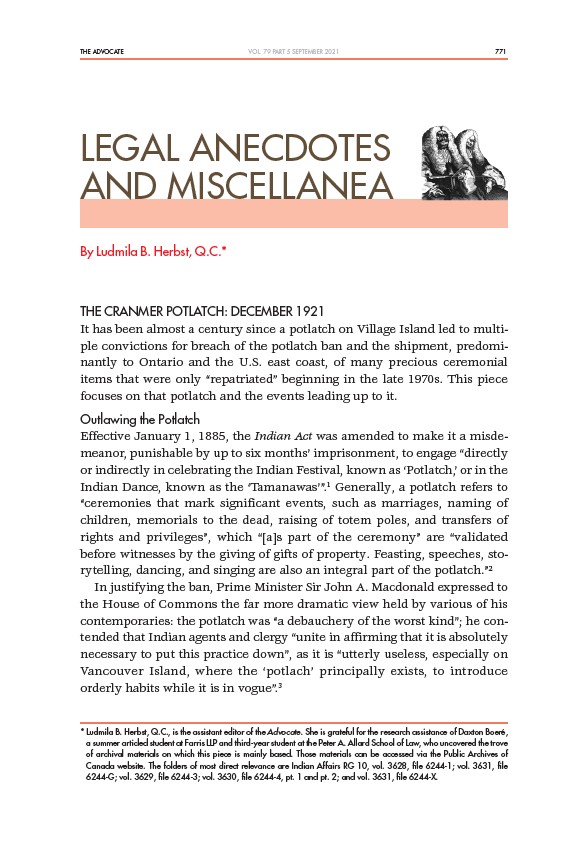
THE ADVOCATE 771
VOL. 79 PART 5 SEPTEMBER 2021
LEGAL ANECDOTES
AND MISCELLANEA
By Ludmila B. Herbst, Q.C.*
THE CRANMER POTLATCH: DECEMBER 1921
It has been almost a century since a potlatch on Village Island led to multiple
convictions for breach of the potlatch ban and the shipment, predominantly
to Ontario and the U.S. east coast, of many precious ceremonial
items that were only “repatriated” beginning in the late 1970s. This piece
focuses on that potlatch and the events leading up to it.
Outlawing the Potlatch
Effective January 1, 1885, the Indian Act was amended to make it a misdemeanor,
punishable by up to six months’ imprisonment, to engage “directly
or indirectly in celebrating the Indian Festival, known as ‘Potlatch,’ or in the
Indian Dance, known as the ‘Tamanawas’”.1 Generally, a potlatch refers to
“ceremonies that mark significant events, such as marriages, naming of
children, memorials to the dead, raising of totem poles, and transfers of
rights and privileges”, which “as part of the ceremony” are “validated
before witnesses by the giving of gifts of property. Feasting, speeches, storytelling,
dancing, and singing are also an integral part of the potlatch.”2
In justifying the ban, Prime Minister Sir John A. Macdonald expressed to
the House of Commons the far more dramatic view held by various of his
contemporaries: the potlatch was “a debauchery of the worst kind”; he contended
that Indian agents and clergy “unite in affirming that it is absolutely
necessary to put this practice down”, as it is “utterly useless, especially on
Vancouver Island, where the ‘potlach’ principally exists, to introduce
orderly habits while it is in vogue”.3
* Ludmila B. Herbst, Q.C., is the assistant editor of the Advocate. She is grateful for the research assistance of Daxton Boeré,
a summer articled student at Farris LLP and third-year student at the Peter A. Allard School of Law, who uncovered the trove
of archival materials on which this piece is mainly based. Those materials can be accessed via the Public Archives of
Canada website. The folders of most direct relevance are Indian Affairs RG 10, vol. 3628, file 6244-1; vol. 3631, file
6244-G; vol. 3629, file 6244-3; vol. 3630, file 6244-4, pt. 1 and pt. 2; and vol. 3631, file 6244-X.